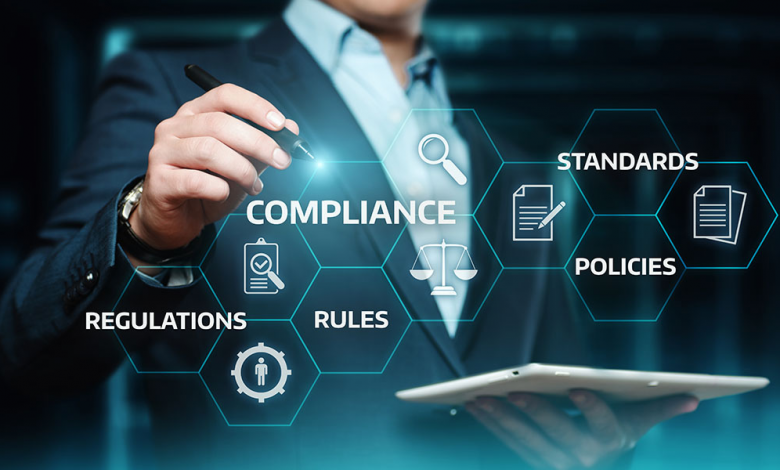What is Regulatory Compliance & How Custom Compliance Software Can Help in Skyrocketing Your Business

In a few high-profile, 2017 data-breach examples, Hilton Hotels paid $700.000 to state regulators, and Target paid $18.5 million to settle regulatory actions and claims. Not following compliance regulations, you might even risk losing access to certain segments of your customer base. For example, if you violate HIPAA regulations, you could lose access to certain insurance companies or risk your license with the state.
Let’s see some of the common advantages of an organization complying with regulatory compliance, and using custom compliance management software. The tips and cases presented in the article were prepared by the construction software development company’s specialists.
Regulatory Compliance Management Definition
According to the Intelvision software development company, compliance is the principle of doing business following applicable laws, rules, and standards established by the competent authorities, professional associations, and internal documents of a financial institution.
Regulatory compliance is a prevalent business concern. Some important regulations, standards, and laws that organizations may need to comply with include:
Sarbanes-Oxley Act (SOX): SOX was enacted in response to the high-profile financial scandals of Enron and WorldCom to protect shareholders and the general public from accounting errors and corporate fraud.
Spam Act: it requires companies to mark commercial emails as promotional, use legitimate return email addresses, provide recipients with an opt-out option, and process opt-out requests within 10 business days.
Health Insurance Portability and Accountability Act (HIPAA): it is a broad set of rules created to protect the identity and privacy of people using health care. They require doctors, hospitals, insurance companies, and other organizations that handle personal health information to be extremely careful about how they store that information and to who they allow access to it.
Payment Card Industry Data Security Standard (PCI DSS): PCI DSS is a set of policies and procedures created in 2004 by Visa, MasterCard, Discover, and American Express to secure credit, debit, and cash cards transactions.
Compliance instructions vary by country. SOX, for example, is US law. Similar legislation in other countries includes Deutscher’s German Corporate Governance Code and the Australian Corporate Law Economic Reform Program Act 2004. As a result, multinational organizations need to be aware of the regulatory requirements of each country where they operate.
Many organizations have even added compliance-related roles, such as the Director of Compliance. Key responsibilities of the Chief Compliance Officer include ensuring that the organization can both manage compliance risk and undergo compliance audits. Other possible compliance roles include:
- Compliance analysts. The specialist helps companies remain compliant with regulations and prepare them for audits.
- Compliance services associates. This role focuses on identifying, prioritizing, and resolving issues for clients.
- Compliance coordinator. This specialist focuses on preparing and completing regulatory and compliance documents, as well as making sure they adhere to federal, state, and government requirements.
Benefits of Complying Compliance for Your Company
The importance of compliance is becoming increasingly clear as the issues become more complex as the business grows. A growing business has increasing responsibilities to employees, including hiring, firing, security, payroll, and benefits.
Decreasing in Legal Problems
The most obvious benefit of compliance is that it reduces the risk of fines, penalties, work stoppages, lawsuits, or business closures.
Best Public Relations
When legal obligations are met, one of the benefits of compliance is being able to advertise them on your website and in your marketing materials. For example, when posting job ads.
Employee Loyalty
Many compliance issues are related to the protection of employees. The more employees feel they are working in a fair, professional, and safe environment, the more likely they are to stay with the company longer.
Business Reputation in a Market
Trust is the most important factor contributing to a business’s reputation. When a company starts facing legal issues, the public will lose its trust. So it is important to abide by compliance to build a positive reputation in a market.
Consumer Trust
Consumer Trust is built over time. It drives corporate profitability. Any non-compliance breaks the trust which was built over the years.
How a Regulatory Compliance Software Can Help You To Prevent Fines and Reputation Fails
Regulatory compliance software allows teams to avoid compliance breaches by always staying up to date with regulatory requirements, in a digital way. For financial institutions, implementing custom compliance management software means way more than a digital transformation project solely. It is about setting up digital banking compliance processes by removing complexity from regulatory requirements and using compliance automation so that teams can instead focus on customers and generate more revenue.
Make Compliance Simple And Easy! Financial compliance software provided by Intelvision is scalable and easy to use—for both end users and administrators—helping companies reduce risk, gain efficiencies, and drive employee adoption.




